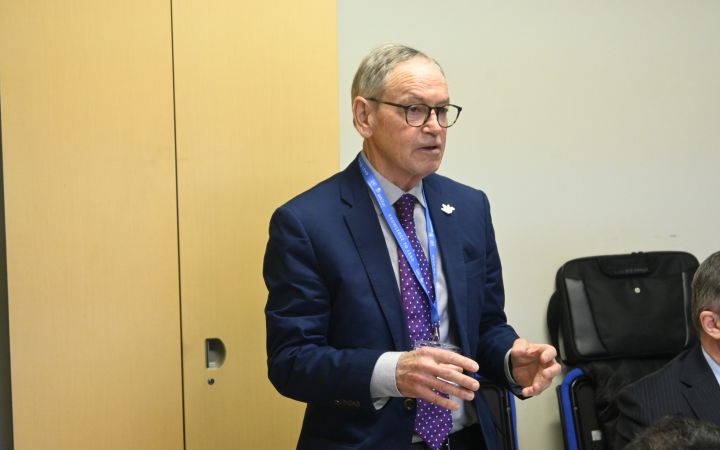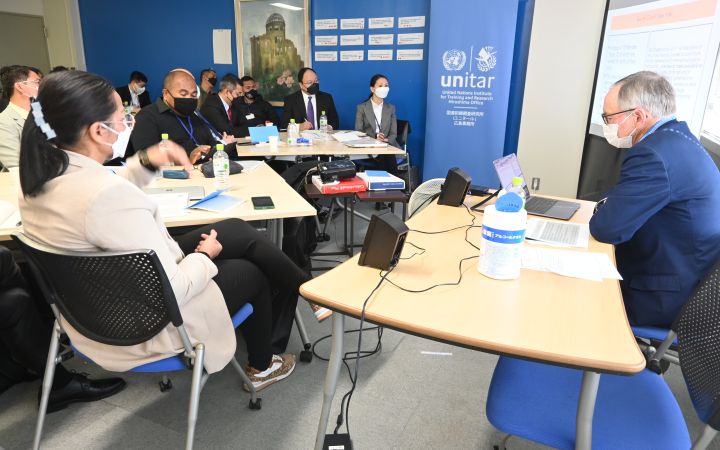- Tim Caughley is a non-resident fellow of the United Nations Institute for Disarmament Research.
- Tim has trained diplomats and military advisers from all over Asia since 2015 for the UNITAR Hiroshima Nuclear and Non-Proliferation (NDNP) Training Programme.
- The programme gives diplomats the unique opportunity to learn in a city steeped in history and perfectly suited for training on nuclear disarmament.
- Nuclear war will remain a threat in the next 20 years. Diplomats will need the skills to bring about nuclear disarmament and non-proliferation.
16 May 2023, Hiroshima, Japan - Tim is a non-resident fellow of the United Nations Institute for Disarmament Research (UNIDIR). Before joining UNIDIR, he served as the Director of the United Nations Office for Disarmament Affairs in Geneva, Deputy Secretary-General of the Conference on Disarmament, and Disarmament Ambassador and Permanent Representative of New Zealand to the United Nations in Geneva.
Since 2015, Tim Caughley has been training diplomats and military advisers from all over Asia through the UNITAR Hiroshima Nuclear and Non-Proliferation (NDNP) Training Programme. The global expert on nuclear disarmament reflects on the significance of training diplomats on nuclear disarmament from Hiroshima, as the UNITAR Hiroshima Office celebrates its 20th anniversary.
EQUIPPING DIPLOMATS WITH REFERENCE POINTS
Having been in the nuclear disarmament field for many years, Tim sees the value of the UNITAR NDNP programme in creating a space for diplomats to exchange ideas and knowledge. The programme brings together a diverse group of people and gives them the chance to practice their new understanding and skills through project-based work and a negotiation simulation. Through engaging with each other, the diplomats learn about different viewpoints on nuclear affairs – an awareness they can then use to better negotiate in nuclear disarmament conferences.
Tim explains that the programme also creates reference points. Not only do the trained diplomats leave the programme with a better understanding of the system of international institutions and forums for nuclear disarmament; but they also have extensive resource materials that they can refer to in the future.
HIROSHIMA SHAPES THE TRAINING PROGRAMME
Reflecting on the rounds of the UNITAR NDNP Programme he has taught, Tim highlights the power of basing the training in Hiroshima.
This is fundamental to the experience that participants get because they can see for themselves and reflect on the horrors of the [atomic] bombing.
Participants meet with Hibakusha, the survivors of the atomic bombing, who share their first-hand accounts of the social and emotional toll of nuclear war. For Tim, too, the many captivating conversations with hibakusha have been some of the most memorable experiences during his time in Hiroshima.
Tim also enjoys the proximity of the UNITAR office and the iconic atomic bomb dome, right across the street from each other. The dome is a visceral reminder of the devastation brought about by nuclear weapons. Hiroshima is also a symbol of hope, and its historical and cultural significance is displayed everywhere in the city. To be in Hiroshima, Tim believes, is itself an experience that makes the training stand out.
THE FUTURE OF UNITAR HIROSHIMA OFFICE
As UNITAR Hiroshima Office celebrates its 20th anniversary, Tim looks to the future of nuclear disarmament. He expects that nuclear disarmament will become a necessity soon. And that has almost everything to do with the current global political landscape.
For all of us in this area of nuclear disarmament, a lot is going to hinge on how the situation in Ukraine plays out. Whatever the outcome, it will have brought with it an increased urgency for nuclear disarmament.
He expects UNITAR to continue promoting a better understanding of nuclear disarmament and the Hiroshima experience across the world. Nuclear war will remain a far-reaching threat in the next 20 years. Tim stresses the importance of nurturing diplomats who can help bring about nuclear disarmament and non-proliferation for a peaceful world.
About UNITAR
The United Nations Institute for Training and Research (UNITAR) is a dedicated training arm of the United Nations. In 2021, UNITAR trained 370,139 learners around the world to support their actions for a better future. In addition to our headquarters in Geneva, we have offices in Hiroshima, New York, Bonn and various networks around the world.
One of the eight divisions of UNITAR, the Division for Prosperity, based in the Hiroshima Office and Geneva Headquarters, seeks to shape an inclusive, sustainable and prosperous world. World-class learning and knowledge-sharing services on entrepreneurship, leadership, finance and trade, digital technologies, and nuclear disarmament and non-proliferation are offered. We empower individuals from developing countries – especially women and young people – to address inequalities. Our alumni are making a difference in least-developed countries, countries emerging from conflict, and small-island developing states.
United Nations Online Volunteer Puca Carlo contributed to this article.



